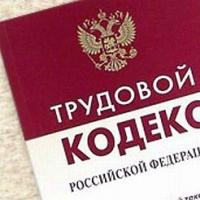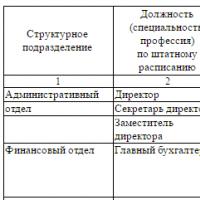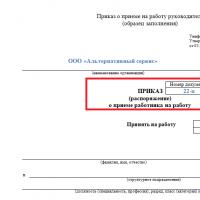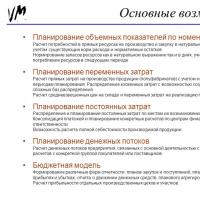Tests of Solzhenitsyn's story Matrenin Dvor. A.I. Solzhenitsyn "Matryonin's Dvor" (questions for analyzing the story) educational and methodological material on literature (grade 11) on the topic. Fragment from the story of I.S. Turgenev "Biryuk"
To use presentation previews, create a Google account and log in to it: https://accounts.google.com
Slide captions:
Quiz based on the story by A.I. Solzhenitsyn “Matryonin’s Dvor”.
What words does A.I.’s story begin with? Solzhenitsyn's "Matryonin's Dvor"? “At one hundred and eighty-fourth kilometer from Moscow along the line that goes to Murom and Kazan, for a good six months after that all the trains slowed down, as if to the touch.”
When was the story "Matryonin's Dvor" written? In 1959.
Both of these stories were published in 1963 in the January issue of the magazine New world" What do the stories of A.I. Solzhenitsyn “Matryonin’s Dvor” and “The Incident at Kochetovka Station” have in common?
What connects the story “Matryonin’s Dvor” and A.T. Tvardovsky? It was he who gave it this name.
What was the original title of the story “Matryonin’s Dvor”? “A village is not worthwhile without a righteous man.”
Having woken up one night in smoke, what rushed to save Matryona? She began to throw ficus trees on the floor so that they would not suffocate from the smoke.
What was hanging “on the wall for beauty” in Matryona’s house? Ruble posters about the book trade and the harvest.
Matryona cooked food in three cast iron pots. In one - for himself, in the other - for Ignatichu, and in the third -...? Kose.
What did Matryona feed her tenant? “Unhulled cardboard soup”, “cardboard soup” or barley porridge.
What sure remedy did Matryona have to regain her good mood? Job.
Continue. “But Matryona was by no means fearless. She was afraid of fire, she was afraid of lightning, and most of all for some reason....” Trains.
What event or omen happened to Matryona at Epiphany? The pot with holy water has disappeared.
Give Matryona's full name. Grigorieva Matryona Vasilievna.
What the author says: “But it must have come to our ancestors from the very Stone Age because, once heated before daylight, it stores warm feed and swill for livestock, food and water for humans all day long. And sleep warmly." About the Russian stove.
What part of the house did Matryona bequeath to her pupil Kira? Upper room.
Matryona’s clock was 27 years old and it was in a hurry all the time, why didn’t this bother the owner? “If only they didn’t lag behind, so as not to be late in the morning.”
What music heard on the radio did Matryona like? Romances by Glinka.
What kind of weather did Matryona call duel? Blizzard.
“The frozen window of the entryway, now shortened, glowed slightly pink from the red frosty sun,” and Matryona’s face was warmed by this reflection. Those people always have good faces who....” Continue. “At peace with your conscience.”
Why was it difficult for Matryona to give up the upper room during her lifetime? “I didn’t feel sorry for the upper room itself, which stood idle, just as Matryona never felt sorry for her work or her goods. And this room was still bequeathed to Kira. But it was scary for her to start breaking the roof under which she had lived for forty years.”
What was Thaddeus thinking as he stood at the tombs of his son and the woman he had once loved? “His high forehead was darkened by a heavy thought, but this thought was to save the logs of the upper room from the fire and from the machinations of the Matryona sisters.”
Continue: “Misunderstood and abandoned even by her husband, who buried six children, but did not have a sociable disposition, a stranger to her sisters and sisters-in-law, funny, foolishly working for others for free - she did not accumulate property for death. A dirty white goat, a lanky cat, ficus trees... We all lived next to her and did not understand that she was the one....” “...a righteous man, without whom, according to the proverb, the village does not stand.”
On the topic: methodological developments, presentations and notes
The test of the righteous by suffering (based on the story by A.I. Solzhenitsyn “Matryonin’s Dvor”)
The article is devoted to one of the best works of short prose by A. Solzhenitsyn, who continued the traditions of N. Leskov in depicting the image of the Russian hero-worker, the righteous...
"The Sign Club" based on the biography of A.I. Solzhenitsyn, based on the stories "Matrenin's Dvor" and "One Day in the Life of Ivan Denisovich")
The event can be extracurricular, or it can be held as a final lesson on the creativity of A.I. Solzhenitsyn....
Literary quiz based on the story by A.I. Solzhenitsyn “Matryonin’s Dvor”
Goals:
· development of students’ cognitive interest in the works of A.I. Solzhenitsyn;
· using a quiz as a didactic material to test students’ knowledge of the content of a story (orally or in writing);
· it is possible to hold a literary tournament on the works of A.I. Solzhenitsyn using this material.
1.General section
1. What was the original title of the story?
2. Who insisted on changing the title of the story?
3. When was the story written?
4. Name the year of action in the story.
5. What year was the story published?
6. Name the first name, last name, and patronymic of the heroine after whom the yard is named.
7. What is the name of the village where the events take place?
8. What associations did the name of the village of Talnovo evoke in Ignatich?
9. In what meaning is the word “kondovy” used?
10. What are the meanings of the key image of the story “Matryonin’s Dvor”?
11. What music is closer to Matryona Vasilyevna - folk songs performed by Chaliapin or Glinka's romances? Why?
12. Was Matryona Vasilievna happy in family life?
13. Why did fellow villagers believe that there was “damage” in Matryona Vasilyevna, where, in their opinion, did it manifest itself?
14. How did Matryona Vasilievna regain her “good”?
mood?
15 .What was her house in which she lived for 40 years for Matryona?
16 . Why does Matryona decide to give Kira the upper room?
17. How does the author show the sacrilegious nature of the actions of those who
encroached on the integrity of Matryonin’s yard?
2.Whose portrait is this?
1 . “The simple-minded look of faded blue eyes,” “a radiant smile.”
2. “She was also a city woman, decisive, with a short gray pea coat and a menacing look, as if she were a military woman.”
3. “His whole face was covered with thick black hair, almost untouched
gray hair: with a thick black beard merged a thick, black mustache,
so the mouth was barely visible...”
4. . "... round and ruddy... looking like a cat after pancakes."
5 . “Her curled locks were pathetically disheveled. Red as blood
the eyes were flooded.”
3. Which of the characters in the story...
“...she and her husband raised her elderly mother”?
“...on the collective farm she did not work for money - for sticks. For sticks of workdays in the accountant’s dirty book”?
“...it fell for a day - two lay flat. She didn’t complain, didn’t moan, but she hardly moved either”?
“Afraid...of fire, afraid of fire, and most of all, for some reason, of a train”?
She complained “that her husband beats her, and her stingy husband pulls the veins out of her, and she cried... for a long time, and her voice was always in tears...”?
“running down the street at men with fists...”?
“...everyone unanimously cursed her (Matryona) as a fool for giving away the upper room, they said that they didn’t want to see her anymore...”?
“I wanted to hang myself, they took me out of the noose... Now I went myself and was arrested. But now he’s not in prison, he’s in a madhouse”?
“...didn’t come to Matryona’s wake...But in the coming days he came to this hut twice with hostility to negotiate with Matryona’s sisters and with the deserter shoemaker”?
“And even about Matryona’s cordiality and simplicity...she spoke with contemptuous regret.”
4.Who owns the words:
1 . “This work is neither to the post nor to the railing.”
2. “Fear the tailor and the shepherd. They'll praise you all over the village, if anything happens to them.
not this way".
3 . “Those people always have good faces who are at peace with their conscience.”
4 . “Dunno lies on the stove, and Know-Nothing is led on a string...”
5 . “There are two mysteries in the world: how I was born, I don’t remember; how I will die, I don’t know.”
6 . “I didn’t chase outfits. Behind the clothes that embellish the freaks and
villains."
7. “We all lived next to her and did not understand that she was the one
righteous , without which, according to the proverb, the village does not stand.
Neither the city.
Neither the whole land is ours.”
8. “So, according to Solzhenitsyn,righteous - this is the one in whom he incarnated
the high ethical ideal of the Russian people, which coincides in its
basic “parameters” with the Christian ideal.”
9. Who said that after publication in 1963 in the magazine “New World”
story "Matryonin's Dvor" "village prose" "has become not just
peasant, but Christian"?
10. "…main theme creativity this writer (Solzhenitsyn) is not at all a criticism of communism and not a curse on the Gulag, butthe struggle between good and evil is an eternal theme of world art
Answers.
1. General section.
1 . “A village is not worthwhile without a righteous man.”2 . A.T. Tvardovsky.3 .1959. 4. 1956.
5 . 1963. 6. Matryona Vasilievna Zakharova.7 .Talnovo.8. The dream of a condo Russia.9 .Meaning “ancient, primordial.”10 . 1) Specific socio-historical. 2) Symbolic meaning: the yard (house) of Matryona Vasilyevna is an island of Christian Russia, people live here according to the laws of Christian morality.11 . Glinka's romances: in the songs performed by Chaliapin, Matryona Vasilievna felt artificiality, play, and Glinka's romances for the heroine are like a prayer that enlightens and transforms.12. No.13 .Six children died one after another, “didn’t pursue things,” she was “not careful,” “stupid,” she helped strangers unselfishly, “and even about cordiality and simplicity,” the Matryonas spoke “with contemptuous regret.”14 . With the help of work, after which Matryona became enlightened and spiritualized.15. This was her life, her fortress, her “lifeline.”16 . Matryona, in principle, cannot refuse to help someone in need, much less her pupil.17. “Everyone worked like crazy... in a frenzy...”
2. Whose portrait is this?
1. Matryona.2 . Chairman's wives.3 . Faddey Grigoriev.4 . Antoshka Grigorieva.5. Kira, Matryona's adopted daughter.
3. Which of the characters in the story...
1 .A woman who sold milk.2 .Matryona.3 . Matryona.4 . Matryona.5 .Matryona, wife of Thaddeus.6. Efim, husband of Matryona Vasilievna.7 .Three sisters of Matryona.8 . Kira's husband.9 . Thaddeus.10 .Matryona's sister-in-law.
4. Who owns the words?
1. Matryona.2. Matryona.3 .Auto RU.4. Masha, Matryona's friend.5 .Ancient
old woman.6 . Auto RU.7 . Auto RU.8 . A.V. Urmanov.9 . V. Chalmaev.
10. A.V. Urmanov.
Municipal budget educational institution
"Lyceum No. 1" r.p. Chamzinka, Chamzinsky district, Republic of Mordovia
Tests (2 options) based on the story
A.I. Solzhenitsyn "Matryonin Dvor"
10-11 grade
prepared by teacher of Russian language and literature Svetlana Petrovna Pechkazova
Chamzinka
2012
Explanatory note
Tests on the works of A.I. Solzhenitsyn allow us to identify the level of ability to analyze a fragment of an epic work. The resource contains questions about the ideological content of his works,features of the genre, figurative and expressive means of language, questions on knowledge of the text.
For each question in Part A, there are four possible answers. Part B tasks require a detailed answer.
The presented resource can be used in the final literature lesson on the writer’s work in grades 10-11.
Evaluation criteria:
“5” (excellent) - the work was completed flawlessly,
“4” (good) - correct answers account for 80% of total number questions,
“3” (satisfactory) - correct answers make up 50-70% of the total number of questions.
TEST
So I settled with Matryona Vasilievna. We didn't share rooms. Her bed was in the corner of the door by the stove, and I unfolded my cot by the window and, pushing Matryona’s favorite ficus trees away from the light, I placed another table by another window. There was electricity in the village - it was brought in from Shatura back in the twenties. The newspapers then wrote “Ilyich’s light bulbs,” and the men, their eyes wide, said: “Tsar Fire!”
Maybe to some from the village, who are richer, Matryona’s hut did not seem like a good-looking hut, but for us that autumn and winter it was quite good: it had not yet leaked from the rains and the cold winds did not blow the stove’s heat out of it right away, only in the morning, especially when the wind was blowing from the leaky side.
Besides Matryona and me, the other people living in the hut were a cat, mice and cockroaches. The cat was not young, and most importantly, she was lanky. She was picked up by Matryona out of pity and took root. Although she walked on four legs, she had a strong limp: she was saving one leg, it was a bad leg. When the cat jumped from the stove to the floor, the sound of her touching the floor was not cat-soft, like everyone else’s, but a strong simultaneous blow of three legs: stupid! - such a strong blow that it took me a while to get used to it, I shuddered. It was she who put up three legs at once to protect the fourth.
A2. What place does the fragment occupy in the work? A) is exposition, B) ends the story, C) is the climax of the plot, D) is the culmination of the plot action.
A3. The main theme of this fragment is: A) the narrator’s lifestyle, B) Matryona’s house, C) Matryona’s appearance, D) nature.
A4. Why did Matryona adopt the cat? A) for material reasons, B) out of pity, C) out of nothing to do, D) out of love for animals.
A5. For what purpose is this fragment describing Matryona’s hut? A) show her originality and difference from others, B) compare Matryona with the narrator, C) reveal the character of the heroine, D) interest the reader.
IN 1. What artistic means of expression helps the author describe the heroine and express his attitude towards her: “a friendly hut”, “favorite ficus trees”, “on the leaky side”?
AT 2. What artistic, figurative and expressive means does the author use in the sentence: “The newspapers then wrote “Ilyich’s light bulbs,” and the men, their eyes wide, said: “Tsar Fire!”?
AT 3. Name a means of creating the image of the hero, based on the description of his home: “We did not share rooms” and so on.
AT 4. Write the name of the heroine's favorite plant.
AT 5. What epithet characterizes Matryona's cat?
TEST
A.I. Solzhenitsyn. "Matryonin Dvor"
Read the text and complete tasks A1 – A5, choosing one correct answer:
In general, looking closely at Matryona, I noticed that, in addition to cooking and housekeeping, every day she had some other significant task, she kept the logical order of these tasks in her head and, waking up in the morning, she always knew what her day was about today. will be busy. Besides the peat, besides collecting old stumps turned up by a tractor in the swamp, besides the lingonberries soaked in quarters for the winter (“Sharpen your teeth, Ignatich,” she treated me), besides digging potatoes, besides running around with the pension matter, she had to have somewhere else— then to get hay for his only dirty white goat.
- Why don’t you keep cows, Matryona Vasilievna?
“Eh, Ignatich,” explained Matryona, standing in an unclean apron in the kitchen doorway and turning to my table. “I can get enough milk from a goat.” If you get a cow, she’ll eat me with her feet. Don’t mow at the canvas - they have their own owners, and there’s no mowing in the forest - the forestry owner, and on the collective farm they don’t tell me - I’m not a collective farmer, they say, now. Yes, they are collective farmers before the whitest flies all go to the collective farm, and from under the snow - what kind of grass?... They used to boil with hay at low water, from Petrov to Ilyin The grass was considered to be honey...
So, one smart goat had to collect hay for Matryona - great work. In the morning she took a bag and a sickle and went to the places that she remembered, where the grass grew along the edges, along the road, along the islands in the swamp. Having filled the bag with fresh heavy grass , she dragged it home and laid it out in a layer in her yard to make a sack of dried hay - a fork.
A1. Determine the genre of the work from which the fragment is taken: A) story, B) tale, C) true story, D) novel.
A2. What place does the fragment occupy in the work? A) is exposition, B) ends the story, C) is the culmination of the plot action, D) is the climax of the plot.
A3. The main theme of this fragment is: A) human envy, B) Matryona’s working day, C) the beauty of the village of Talnovo, D) village life.
A4. What did Matryona do day after day? A) raising grandchildren, B) only cooking and housekeeping, C) caring for livestock, D) Matryona had a lot of things to do.
A5. For what purpose is this fragment describing Matryona’s everyday life? A) reveal the heroine’s lack of a serious attitude towards life, B) show the depressing effect of routine on the human soul, C) reveal the heroine’s lifestyle, D) interest the reader.
Complete task B1 – B5 with a detailed answer:
IN 1. What artistic means of expression helps the author describe the heroine and express his attitude towards her: “great”, “heavy”, “honey”?
AT 2. Name a means of creating a hero’s image that is based on a description of his actions (from the words: “Except for peat...”)
AT 3. From Matryona’s remark, write a sentence that explains why she did not keep a cow.
AT 4. What artistic means of expression does the author use in the second paragraph?
AT 5. From the paragraph beginning with the words: “So, for one fat goat...”, find a word that explains how much hay was obtained from a bag of freshly cut grass.
References:
Korshunova I.N., Lipin E.Yu. Tests on Russian literature. – M.: Bustard, 2000.
Romashina N.F. Literature tests for current and general control. – Volgograd: Teacher, 2007
Berezhnaya I.D. Current control of knowledge in literature. – Volgograd: Teacher, 2008
Mironova N.A. Literature tests in 11th grade. - M.: Exam, 2008.
- We learn about Matryona Vasilyevna from the story of the hero - the narrator, the only person who understood and accepted Matryona. The narrator is close to the author, but not equal to him. The author deliberately emphasizes this distancing from the hero-narrator, giving him the “name and patronymic” Ignatich. What do we learn about him from the prologue?
- Did Ignatyich atone for his own or others’ sins?
- How are the fates of the writer and the hero of the story similar?
- Remember under what circumstances do readers first meet Matryona?
- Does Matryona want to get such a “profitable” guest? Support your answer with a quote from the text.
- Why does the narrator decide to stay with her?
- How does a typical day go for Matryona?
- What story of Matryona’s “chopped life” did the author-storyteller tell us?
- Is Matryona angry at this world, which is so cruel to her? Support your answer with examples from the text.
- What was her sure way of regaining her good spirits?
- How does Matryona feel about work?
- How do people around her use her work?
- How do the people around her treat Matryona?
- What role did they play in the fate of the main character?
- Were there any moments of joy in Matryona’s life?
- Solzhenitsyn divided his story into three parts. How can they be titled?
- What typical phenomena of Russian reality does the author emphasize, revealing the life of the village in the 50s?
- Did Matryona become embittered or find another means of survival?
- Why did Matryona have to steal?
- How was Matryona’s relationship with the authorities?
- How did village women resist the authorities in the struggle for survival?
- What did the authorities do when they saw the exhausting work of women?
- Did the authorities know how to organize people into useful and highly paid work?
- What is the relationship between Matryona and the narrator?
- What destroys this silence, the usual foundation of their relationship?
- Give a description of Thaddeus's appearance. What does it say about his character?
- Did Thaddeus, who returned from Hungarian captivity, understand Matryona’s sacrifice?
- What else does the author say about Thaddeus?
- How can we explain the difference between the dissimilar souls of Matryona and Thaddeus?
- What does the author focus the reader’s attention on? What “talking” epithet characterizes this hero?
- Is the author right when he says: “The threat of Thaddeus lay in the corner for forty years... but it finally struck”? What is this
threat?
- What moment was the turning point in Matryona’s life? Why?
- Why does Matryona marry Efim?
- Are you inclined to condemn or justify Matryona in this situation?
- What changed Matryona’s usual way of life?
- Why is it difficult for Matryona to decide to give the bequeathed room to her pupil during her lifetime?
- Why “does she not sleep for two nights”, thinking about the upper room? Does she feel sorry for the upper room? Confirm your answer
quote from the text.
- Why does the reader believe her?
- Why does he feel that events will indeed end tragically?
- Where has the author already managed to prepare us for just such an ending?
- Try to look for these author’s “trips” set up for the reader.
- Why does Matryona rush after the sleigh?
- How does the author show us concern for Matryona, the feeling that trouble will happen?
- What did our friend Masha tell us about the last minutes of Matryona’s life, about the tragedy that occurred at the crossing?
- Observe the behavior of the people gathered at Matryona's funeral. Describe them.
- Which of them sincerely experiences the death of Matryona, the bitterness of her loss?
- The author admits that he, who became related to Matryona, has no selfish interests.
the pursuer, however, did not fully understand her. And only death revealed to him
majestic and tragic image of Matryona. What is it?
- What words from the text can be taken as an epigraph to the image of Matryona? What is the tragedy of her fate?
- Why does Matryona tell Ignatyich about her life?
- Can Matryona Vasilievna be called beautiful? What is this beauty?
- Who is to blame for the death of Matryona: people, events, fate?
- The first version of the title of the story is “A village is not worthwhile without a righteous man.” Reveal his philosophical
meaning.
- How to interpret the meaning of the initial title of the story?
- Has the meaning of the title of the story under the second heading changed? How?
- As you understand final words works? Do you agree with them?
- What is the meaning of the word “righteous”?
- What do you think is the meaning of the title of the story “Matrenin’s Dvor”?
- With the death of Matryona, does this world collapse?
- Who can protect “Matrenin Dvor”?
- This question is complex, and it once again brings us back to rethinking the conversation about the meaning of life. What does it consist of, based on the story of A.I. Solzhenitsyn?
- Do you think such righteous people are needed in our lives? Why? For what?
- Is righteousness possible in our lives and do you know people who can be called
righteous?
- Which writer touched on this same problem? What is their understanding of righteousness?
- What other problems did you see in this story?
- Are there any moments in the work that shocked you?
- How does Solzhenitsyn understand Russian character?
- What other ideas about Russian folk character are stated in the story?
- Can we say that A.I. Solzhenitsyn’s story “Matryonin’s Dvor” connects some motives
previous literature with subsequent motifs of modern literary works? Give examples.
Place of work, position: - gymnasium No. 5, Sochi, a feast of literature and the Russian language
Region: — Krasnodar region
Characteristics of the abstract:
Levels of education: - secondary (complete) general cumulite
Class(es): - 10 rank
Class(es): – 11th rank
Subject(s): - Literature
Subject(s): - Literary reading
Subject(s): - Russian Balochi
The target audience: - Pupil (student)
Target audience: — Teacher (teacher)
Type of resource: - methodical hydraulic development
Brief status of the resource: - Literary name based on the story by Alexander Solzhenitsyn "Matrenin's Dvor". It can be used like teaching material to test students' knowledge or like a quiz about Solzhenitsyn's work.
Krasnodar Krasnodar region
Sochi, Khostinsky district
Municipal educational institution
Grammar school № 5
METHODOLOGICAL DEVELOPMENT
LITERARY STORY QUIZ
A.I. SOLZHENITSYN “MATRENIN’S Dvor”
and literature
Municipal educational institution gymnasium No. 5
Zorkina Nina Vasilievna
Sochi 2009
Literary name based on the story by A.I. Solzhenitsyn “Matryonin’s Dvor”
Goals:
· development of students’ cognitive interest in the works of A.I. Solzhenitsyn;
· using a quiz as a didactic material to test students' knowledge of the content of the story (orally or in writing);
· it is possible to outline a literary tournament based on the work of A.I. Solzhenitsyn using this material.
1.General section
1. What was the original title of the story?
2. Who insisted on changing the title of the story?
3. When was the story written?
4. Name the time of action in the story.
5. What year was the story published?
6. Name the first name, last name, and patronymic of the heroine after whom the yard is named.
7. What is the name of the village, where do the events take place?
8. What associations did the name of the village Talnovo evoke in Ignatich?
9. What is the meaning of the word “kondovy”?
10. What are the meanings of the key image of the story “Matryonin’s Dvor”?
11. Which bluegrass is closer to Matryona Vasilievna - folk songs performed by Chaliapin or Glinka's romances? Why?
12. Was Matryona Vasilyevna happy in her family life?
13. Why did fellow villagers think that Matryona Vasilyevna was “damaged”?What, in their opinion, did it manifest itself in?
14. How did Matryona Vasilievna regain her “good”?
mood?
15 .What was her house in which she lived for 40 years for Matryona?
16 . Why does Matryona decide to give Kira the upper room?
17. How the writer shows the offensive type of actions of those who
encroached on the synthesis of Matryonin's court?
2.Whose portrait is this?
1 . “The simple-minded gaze of faded blue eyes,” “a radiant smile.”
2. “She was also a city woman, decisive, with a short gray pea coat and a menacing look, like a military woman.”
3. “His entire person was covered with thick black hair, almost untouched
gray hair: with a thick black beard merged a thick, black mustache,
as if the slurp was barely visible...”
4. . "... round, ruddy... looking like a cat then pancakes."
5 . “Her curled locks were annoyingly disheveled. Red like blood
the eyes were flooded.”
3. Which of the characters in the story...
4.Who owns the words:
1 . “This work is neither to the post nor to the railing.”
2. “The tailor truly fears the shepherd. Throughout the village they will praise you, fortunately they
not this way".
3 . “Those people always have good faces, those who are at peace with their conscience.”
4 . “Dunno lies on the stove, and Know-Nothing is led on a string...”
5 . “There are two mysteries in the world: I was born like this, I don’t remember, and I die like this, I don’t know.”
6 . “I didn’t bother with outfits afterwards. Behind the clothes that embellish the freaks and
villains."
7. “We all lived close to her and did not understand that she was a real god
righteous, without which, according to the proverb, the village is not advisable.
Neither the city.
Not all the land is ours.”
8. “So, along Solzhenitsyn, righteous- this is the one embodied in a kilo
high moral embodiment of the Russian people, combined along its
basic “parameters” with the Christian ideal.”
9. Who said, as if then published in 1963 in the magazine “New World”
story "Matryonin's Dvor" "rural everyday life" "has become not just
peasant, but Christian"?
10. "… the main theme of creativity this writer (Solzhenitsyn)is not at all a consideration of communism and not a curse on the Gulag, butthe struggle of good with evil - the eternal dux of world art
Answers.
1. General section.
1 . “It is not advisable to have a farm without a righteous man.” 2 . A.T. Tvardovsky. 3 .1959. 4. 1956.
5 . 1963. 6. Matryona Vasilievna Zakharova. 7 .Talnovo. 8. The dream of a condo Russia. 9 .Meaning “ancient, primordial.” 10 . 1) Specific socio-historical. 2) Symbolic meaning: Matryona Vasilievna’s base (house) is an island of Christian Russia, here they live according to the laws of Christian morality. 11 . Glinka's romances: in the songs performed by Chaliapin, Matryona Vasilyevna felt artificiality, play, and Glinka's romances for the heroine are like a prayer that enlightens and transforms. 12. No. 13 .Six children died one after the other, “didn’t pursue marriage afterward,” was “not careful,” “stupid,” helped strangers unselfishly, “and even about cordiality and simplicity,” the Matryonas spoke “with contemptuous regret.” 14 . With the help of work, then which Matryona became enlightened and spiritualized. 15. This was her life, her fortress, her “lifeline.” 16 . In principle, it is impossible for Matryona to refuse help to someone in need, and even more so to his pupil. 17. “Everyone worked like crazy... in fury...”
2. Whose portrait is this?
1. Matryona. 2 . Chairman's wives. 3 . Faddey Grigoriev. 4 . Antoshka Grigorieva. 5. Kira, Matryona's adopted daughter.
3. Which of the characters in the story...
1 .A woman who sold milk. 2 .Matryona. 3 . Matryona. 4 . Matryona. 5 .Matryona, Lilith Thaddeus. 6. Efim, Matryona Vasilyevna’s faithful. 7 .Three sisters of Matryona. 8 . Kira's husband. 9 . Thaddeus. 10 .Matryona's sister-in-law.
4. Who owns the words
1. Matryona. 2. Matryona. 3 .Auto RU. 4. Masha, Matryona's friend. 5 .Ancient
10. A.V. Urmanov.
Files:
File size: 58953 bytes.
 Purpose: basic technical data of the AL 31F engine
Purpose: basic technical data of the AL 31F engine What is severance pay?
What is severance pay? How to number the decisions of the sole founder of an LLC?
How to number the decisions of the sole founder of an LLC? How to fill out a vacation schedule?
How to fill out a vacation schedule? Traffic light concepts, history, purpose Food discounter traffic light
Traffic light concepts, history, purpose Food discounter traffic light Order for the appointment of the General Director: sample filling, download form
Order for the appointment of the General Director: sample filling, download form Master of Finance Master of Finance Analysis and Planning
Master of Finance Master of Finance Analysis and Planning